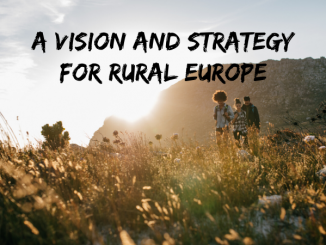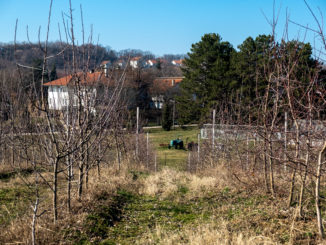As part of our rural sociology RETHINK Modernisation series, we present an article on governance mechanisms. This article explores new organisational forms, roles and partners, while presenting six vital conditions for success.

By Elke Rogge and Marlinde E. Koopmans
Why is it so hard for many of the innovative farm-based initiatives we see popping up everywhere to not just survive, but thrive? There are a myriad of examples – farmers who maintain their shared landscape together, cooperatives that produce and market local honey, organic farmers who work together with top chefs – more and more new alliances are popping-up.
However, these initiatives often struggle to organize themselves and to find their way in the multiple policy frameworks and piles of red tape they find themselves embedded in. So what can these initiatives do?
In response, these initiatives develop new organisational forms, come up with new role divisions and cooperate with formerly unknown partners. And they look for innovative governance mechanisms. These mechanisms can orchestrate multi-actor, multi-level and multi-sector rural development pathways, or trajectories. We believe it is essential to understand the governance mechanisms that shape these linkages in order to reconnect agriculture with the wider society.
So, we analysed the governance mechanisms of eleven European-wide case studies, as a part of the trans-disciplinary RETHINK research programme. What did we find out? Here’s six vital conditions for the successful development of multi-actor governance mechanisms.
First, informal networks are crucial in the development of new governance mechanisms. Because of an absence of formal control, they are more open-ended, and can support multiple ways of envisioning and operationalization. This allows innovative strategies to develop more easily.
Second, initiatives must find the right balance between grass root action and professionalisation. Within all cases bottom up initiatives are an important trigger for change. However, at a certain point many organizations need to scale-up and to develop more formal structures. This is the case when ,for example, they seek out a PDO certificate, apply for public payments or cooperate with other sectors. It is however important to find the right balance between informal participation and effectiveness.
Third, several small democratic units may each exercise considerable independence to make and enforce rules within a limited scope of authority. Such a polycentric decision making system increases the resilience of an initiative. The abundance of strategies within polycentric systems makes them better able to respond to sudden shocks and changes.
Fourth, policy makers must learn from pilots in the field. Although farmers fully accept that regulations are necessary, they also claim that the system is increasingly constraining them. The multitude of regulations creates high entry barriers for innovative development trajectories. The cases we encountered demonstrate that actors at the local level find creative ways to integrate different policies. Governments should use these examples to learn how to develop new policy strategies at higher political levels.
Fifth, empowering farmers to act on their choices is crucial. Policy-makers should pay attention to how farmers develop dynamic capabilities that support the process of making choices and strengthen farmers’ capacity to act. Within policy design we must leave room for farmers and other actors to develop forms of governance that fit their needs.
Sixth, never underestimate the importance of trust and transparency. Trust has been a long-recognized sine qua non of collaboration. Trust is particularly important as a central binding element in informal structures as there are no formal rules to guide and control people’s actions. Interpersonal relationships are the base needed to generate prosperity in rural areas.
Although most of these conditions are recognized by the scientific world, in practice they are rarely translated into effective policy strategies to support territorial development. Therefore, we call upon policy makers to develop strategies that take these six vital conditions into account both when developing new policy as in their day-to-day interaction actions in rural areas.
See the opening article in the RETHINK Modernisation series. See the Journal of Rural Studies special edition here.
 Elke Rogge is scientific director of the Social Sciences Unit of ILVO (Research institute for agriculture, fisheries and food). She graduated as a geographer at Gent University in 2001. After making an PhD on landscape perception and participation she started working at the social sciences unit of ILVO in 2007. Her research mainly focuses on territorial governance and participation within spatial planning processes in rural areas. The last couple of years she also coordinated several research projects on the (possible) role of agriculture in peri-urban areas and the governance of (local) food networks. Between 2013 and 2016 she was a guest professor at the geography department of Ghent University.
Elke Rogge is scientific director of the Social Sciences Unit of ILVO (Research institute for agriculture, fisheries and food). She graduated as a geographer at Gent University in 2001. After making an PhD on landscape perception and participation she started working at the social sciences unit of ILVO in 2007. Her research mainly focuses on territorial governance and participation within spatial planning processes in rural areas. The last couple of years she also coordinated several research projects on the (possible) role of agriculture in peri-urban areas and the governance of (local) food networks. Between 2013 and 2016 she was a guest professor at the geography department of Ghent University.
 Marlinde E. Koopmans obtained a Master in Rural Development at the University of Ghent.
Marlinde E. Koopmans obtained a Master in Rural Development at the University of Ghent.
She is currently doing a PhD at the same university and at ILVO (Research institute for agriculture, fisheries and food).
Her research is focused on processes that reconnect agriculture and society both within an urban and rural context. For more see here and here.
A More Resilient, Equitable & Inclusive Agricultural & Food System





